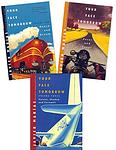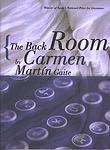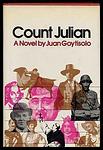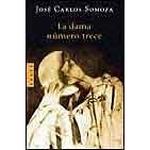The Greatest Argentinian, Spanish "Fiction" Books Since 1970
Click to learn how this list is calculated.
This list represents a comprehensive and trusted collection of the greatest books. Developed through a specialized algorithm, it brings together 300 'best of' book lists to form a definitive guide to the world's most acclaimed books. For those interested in how these books are chosen, additional details can be found on the rankings page.
Genres
Countries
Date Range
Reading Statistics
Click the button below to see how many of these books you've read!
Download
If you're interested in downloading this list as a CSV file for use in a spreadsheet application, you can easily do so by clicking the button below. Please note that to ensure a manageable file size and faster download, the CSV will include details for only the first 500 books.
Download-
1. The Shadow of the Wind by Carlos Ruiz Zafon
The novel follows the story of a young boy in post-war Barcelona, who discovers a mysterious book in a hidden library that his father takes him to, which houses forgotten books. The boy becomes captivated by the book and its author, but as he grows older, he realizes that someone is destroying all books written by this author. As he delves deeper into the mystery, the boy's life becomes intertwined with the author's, revealing a dark and tragic past that someone wants to be kept hidden. The story is a mix of romance, mystery, and a historical narrative set against the turbulent backdrop of a city recovering from war.
-
2. A Heart So White by Javier Marías
The novel delves into the complexities of relationships, secrets, and communication as the protagonist, a translator and interpreter, grapples with the mysterious suicide of his father's first wife and the pervasive silence surrounding it. Through his own marriage and his observations of others', he contemplates the unsaid and the power of words, both spoken and unspoken. The narrative weaves through time and memory, exploring the impact of the past on the present and the intricate ways in which people understand and misunderstand each other.
-
3. Kiss of the Spider Woman by Manuel Puig
"Kiss of the Spider Woman" is a novel set in an Argentine prison where two cellmates, a gay window dresser and a political revolutionary, share stories to pass the time. The window dresser recounts various films he's seen, which often involve strong, glamorous women, while the revolutionary shares his political ideologies. As they spend time together, they form an unlikely bond, exploring themes of sexuality, oppression, and the power of storytelling.
-
4. The Club Dumas by Arturo Pérez-Reverte
The book follows Lucas Corso, a book detective who is hired to authenticate a rare manuscript by Alexandre Dumas. As he delves into the investigation, he finds himself entangled in a mystery involving two other books: a rare edition of "The Three Musketeers" and a satanic text, "The Book of Nine Doors of the Kingdom of Shadows". The narrative becomes a complex puzzle as Corso uncovers connections between the books, while also dealing with a seductive woman who seems to have stepped out of a Dumas novel, a mysterious killer, and a group of bibliophiles obsessed with Dumas. The lines between fiction and reality blur as he gets closer to the truth.
-
5. Bartleby & Co by Enrique Vila-Matas
"Bartleby & Co" is a metafictional work that explores the theme of "writers of the No," authors who cease to write or never start at all. The narrator, an office worker on sick leave, uses footnotes to a nonexistent text to delve into the stories of these authors, including famous real-life figures. The book serves as a meditation on silence, refusal, and the nature of literature itself.
-
6. Your Face Tomorrow: Fever and Spear by Javier Marías
The novel explores the life of a Spanish expatriate in England who is recruited by a secretive organization due to his unique ability to interpret people's behavior. As he becomes entangled in a world of espionage, he grapples with moral and ethical dilemmas, questioning the validity of his work and the consequences of his actions. Through a blend of introspective musings and suspenseful narrative, the protagonist's life unravels, revealing a complex web of deceit, betrayal, and violence.
-
7. The Back Room by Carmen Martín Gaite
"The Back Room" is a surreal narrative that blurs the lines between reality and imagination. The story revolves around a female writer who is visited by a mysterious stranger in the middle of the night. The stranger triggers a series of memories and dreams, transporting her back to her childhood during the Spanish Civil War. As the protagonist delves deeper into her past, she begins to question the nature of her reality, resulting in a psychological exploration of memory, identity, and the power of storytelling.
-
8. Southern Seas by Manuel Vázquez Montalbán
"Southern Seas" is a detective novel set in post-Franco Barcelona. The story revolves around a private detective who is hired to investigate the mysterious disappearance of a wealthy man. As he delves deeper into the case, he finds himself entangled in a web of corruption, violence, and deceit, revealing a dark underbelly of the city's elite society. The narrative is deeply political and social, exploring themes of power, class, and the legacy of Franco's dictatorship in Spain.
-
9. Larva: Midsummer Night's Babel by Julián Ríos
"Larva: Midsummer Night's Babel" is a complex and innovative novel that explores the nature of language and the power of words. It's a narrative labyrinth that follows a group of characters through the streets of London on a midsummer night, as they engage in a series of intellectual debates and discussions. The story is filled with puns, word games, and literary references, and is written in a unique style that blends poetry and prose. The novel is also a satire of the literary world, with the characters often critiquing and parodying various literary styles and authors.
-
10. The Witness by Juan José Saer
"The Witness" is a novel that explores the life of a young European boy who is the only survivor of a shipwreck in the 16th century. He is found and raised by a tribe of Indians in South America, where he spends ten years of his life. The boy is eventually found by a band of Spanish conquistadors and returns to Europe, where he becomes a well-respected scholar. The story unfolds as the man, now in his 90s, recounts his experiences and struggles to reconcile his European identity with his decade-long immersion in the tribal culture.
-
11. Obabakoak by Bernardo Atxaga
Obabakoak is a collection of interconnected stories that revolve around the inhabitants of a fictional Basque village named Obaba. The stories, which are a blend of the magical and the everyday, explore the complexities of human nature, as well as the rich history and culture of the Basque region. Themes of love, fear, tradition, and change are woven throughout, offering a nuanced and evocative portrait of a community and its people.
-
12. All Souls by Javier Marías
"All Souls" is a novel that follows the experiences of a Spanish professor teaching at Oxford University. His life is filled with eccentric colleagues, a puzzling love affair, and a mysterious sense of intrigue. As the protagonist navigates through the academic world, he becomes entangled in a web of personal relationships and bureaucratic intricacies. The book is a blend of romance, suspense, and satire, with a poignant exploration of memory, longing, and the ephemeral nature of human relationships.
-
13. The Censors by Luisa Valenzuela
"The Censors" is a satirical short story that delves into the life of a man who takes a job as a censor at a government agency in an attempt to intercept and approve his own letter, which he had previously sent abroad. As he becomes increasingly absorbed in his role, he starts to censor letters with zeal, losing sight of his original purpose. The story serves as a cautionary tale about the corrupting influence of power and the ease with which one can become complicit in oppressive systems, ultimately leading to a grim and ironic conclusion where the protagonist falls victim to the very system he sought to manipulate.
-
14. Count Julian by Juan Goytisolo
"Count Julian" is a novel that explores the themes of betrayal, revenge, and cultural identity. The protagonist, an exiled Spaniard, reflects on the history of his homeland, Spain, and its past conquests and losses. He identifies with Count Julian, a historical figure who invited the Moors to invade Spain as an act of revenge against the Visigothic King Roderic. The narrative is a critique of Spanish nationalism and cultural identity, as the protagonist dreams of a new invasion to cleanse Spain of its past and present sins. The book's complex narrative structure, nonlinear timeline, and poetic language make it a challenging but rewarding read.
-
15. La Saga/ Fuga de J. B./ The Saga/ Escape of J.B. by Gonzalo Torrente Ballester
"La Saga/ Fuga de J. B./ The Saga/ Escape of J.B." is a complex narrative that explores the themes of reality and fiction, and their intersection. The story revolves around a mysterious character, J.B., who escapes from a novel into the real world. As he navigates this new realm, the boundaries between the fictional world he came from and the reality he now inhabits become increasingly blurred, leading to a surreal and thought-provoking exploration of the nature of existence.
-
16. Santa Evita by Tomás Eloy Martínez
"Santa Evita" is a fictionalized account of the life and death of Eva Peron, the beloved First Lady of Argentina. The book delves into the mysterious journey of her embalmed corpse which was moved around the world and hidden for 16 years after her death. The narrative, interwoven with historical facts, explores the cult-like fascination and devotion that surrounded her during her life and continues after her death.
-
17. A Light Comedy by Eduardo Mendoza
"A Light Comedy" is a humorous tale set in Barcelona during the 1940s, centered around a middle-aged woman who, after losing everything in the Civil War, uses her wits and cunning to survive. She turns her apartment into a boarding house for single ladies, but when the business starts to falter, she decides to concoct a plan to marry a rich American. The novel is filled with a colorful cast of characters, and is a satirical commentary on the social and political climate of the time.
-
18. The Heretic by Miguel Delibes
"The Heretic" is a historical novel set during the Spanish Inquisition. It follows the life of a man born in 16th century Spain, who, despite being raised in a strictly Catholic environment, begins to question the teachings and practices of the Church. As he grows older, he becomes involved in the Protestant Reformation, risking his life in a society where heresy is punishable by death. This book explores themes of faith, religious persecution, and the struggle for freedom of thought.
-
19. The Impenetrable Madam X by Griselda Gambaro
"The Impenetrable Madam X" is a provocative play that delves into the complexities of human relationships and societal expectations. Set against a backdrop of surrealism and absurdity, the narrative follows the titular character, a woman shrouded in mystery and power, who interacts with various other characters in a series of disjointed scenes. Through sharp dialogue and symbolic interactions, the play explores themes of identity, power dynamics, and the struggle for understanding within the confines of a world that oscillates between the real and the fantastical. The work challenges audiences to question the nature of reality and the masks people wear in their daily lives.
-
20. Soldiers of Salamis by Javier Cercas
This novel revolves around a true event during the Spanish Civil War, where a nationalist soldier spares the life of a famous poet who was about to be executed. The story is told from the perspective of a journalist who becomes obsessed with the incident and embarks on a quest to uncover the truth about what happened. As he delves deeper, he discovers the complexities of heroism, history, and memory, and is forced to question his own understanding of these concepts.
-
21. La Dama Número Trece by José Carlos Somoza
This novel is a thrilling blend of mystery, horror, and fantasy, revolving around a struggling writer who becomes the target of a secret society known as "The Thirteen Ladies". These shadowy figures have the ability to manipulate reality through the power of words and storytelling. As he is drawn deeper into their world, he must uncover their secrets and find a way to survive their deadly games. The narrative is a rich exploration of the power of language and mythology, with a suspenseful plot that keeps readers on the edge of their seats.
-
22. We All Love Glenda So Much And Other Tales by Julio Cortazar
This collection of short stories delves into the surreal and the everyday with equal finesse, exploring the boundaries of reality and the quirks of human relationships. The narratives range from the titular tale, which examines the obsessive adoration of a famous actress, to more abstract and fantastical explorations of human experience. The author's masterful prose and innovative storytelling techniques invite readers to question the nature of truth and fiction, often blurring the lines between the two, while presenting a series of vignettes that are both thought-provoking and emotionally resonant.
-
23. Mazurka For Two Dead Men by Camilo José Cela
Set in the rugged landscape of Galicia in the early 20th century, the novel weaves a tale of vengeance and passion through the lives of the inhabitants of a small village. The narrative centers around the murder of a nationalist and the subsequent revenge killing of a local musician, exploring the impact of these deaths on their families and the community. Rich in folklore and the harsh realities of rural life, the story delves into themes of tradition, violence, and the haunting presence of history, all while capturing the deep-seated emotions and complexities of its characters.
-
24. The Owl's Insomnia by Rafael Alberti
"The Owl's Insomnia" is a poetic exploration of themes such as love, death, time, and the sea, reflecting the author's personal experiences and philosophical musings. The collection is characterized by its lyrical quality and vivid imagery, drawing heavily on the author's affinity for the natural world, particularly the maritime landscape that has been a constant in his life. The poems oscillate between a sense of melancholic introspection and an exuberant celebration of life, showcasing the poet's mastery of language and his ability to evoke deep emotional responses from the reader.
-
25. The Infatuations by Javier Marías
A young woman becomes obsessed with a seemingly perfect couple she often sees at a café. When the husband is brutally murdered, she gets entangled with the widow and a mysterious man who knew the couple, leading her to question everything she thought she knew about love, death, and fate. As she delves deeper into the circumstances surrounding the husband's death, she is forced to confront unsettling truths about the nature of human relationships.
Reading Statistics
Click the button below to see how many of these books you've read!
Download
If you're interested in downloading this list as a CSV file for use in a spreadsheet application, you can easily do so by clicking the button below. Please note that to ensure a manageable file size and faster download, the CSV will include details for only the first 500 books.
Download




















